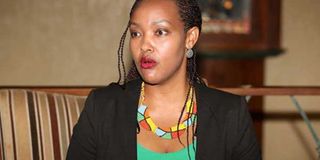New Femnet, Sida partnership to strengthen African women’s voices

Femnet Executive Director Dinah Musindarwezo who has said that the partnership with Sida will help in bringing out transformation in the areas that disproportionately affect women and girls. FILE PHOTO | NATION MEDIA GROUP
What you need to know:
- The strategic partnership focuses on facilitating women’s leadership in policy influencing and advancing their rights.
- The partnership comes as the world marked the 2018 International Women’s’ Day Thursday with the theme #PressForProgress.
- In this first phase of the partnership, the programme will target six countries in four sub-regions of Africa.
Several women in Africa are set to benefit from a four-year programme aimed at strengthening their voices in influencing policies and decisions affecting them at the national, regional and global levels.
This comes after African Women’s Development and Communication Network (Femnet) and the Swedish International Development Cooperation Agency (Sida) – through the Embassy of Sweden in Lusaka, Zambia – entered a strategic partnership focused on facilitating women’s leadership in policy influencing and advancing their rights to their bodily autonomy and integrity.
WOMEN, GIRLS' RIGHTS
The Sh563 million (46 million Swedish Kroner) multi-year programme is set to boost Femnet’s role to advance women’s and girls’ rights and gender equality in Africa through a deliberate and intensified focus on sexual and reproductive health and rights.
Femnet is a pan-African membership-based feminist network based in Nairobi.
The programme will also focus on advocating for access to comprehensive sexual and reproductive health and rights (SRHR) with specific focus on prioritising ending female genital mutilation, access to safe and legal abortion and ending child and forced marriages.
Femnet Executive Director Dinah Musindarwezo said that the partnership will help in bringing out transformation in the areas that disproportionately affect women and girls at a time when women’s rights and particularly sexual and reproductive health ones are under attack.
TIMELY
“This is extremely timely and significant because the need for long term, flexible, more and better funding going directly to women’s rights organisations and movements operating at different levels as key to achieving gender equality,” said Ms Musindarwezo in a press statement.
She also called for the strengthening of women’s rights organisations to take leadership in ensuring access to SRHR, calling for accountability to women’s rights commitments and reaching and multiplying impact.
WOMEN'S DAY
The partnership comes as the world marked the 2018 International Women’s’ Day Thursday with the theme #PressForProgress.
On her part, Femnet board of directors’ chairperson Emma Kaliya, while lauding the partnership, said that more needs to be done to significantly transform the status of women and girls in Africa for sustainable development that serves all to be realised.
“We cannot speak of Africa rising when half of its population is still being marginalised based on gender. We cannot be comfortable with Africa’s progress unless women and girls enjoy equal opportunities and opportunity outcomes and they are equal partners and citizens,” said Ms Kaliya.
Ms Mikaela Hildebrand, Sida regional advisor in Zambia, called for renewed efforts to resource and strengthen continental women’s rights movement and strengthening of alliances across governments, academia, and women’s rights organisations to speed up implementation of key continental commitments such as the Maputo Protocol and the Maputo Plan of Action.
“We are proud to partner with Femnet on this new effort to resource and strengthen the continental women’s rights movement,” said Ms Hildebrand.
FIRST PHASE
In this first phase of the partnership, the programme will target six countries in four sub-regions of Africa including Zambia and Mozambique in Southern Africa, Tanzania and Rwanda in Eastern Africa and, Liberia and Guinea Conakry in Western Africa.
In addition to country focus, the programme will implement a regional approach to connect global, regional, national and local actions and realities and to strengthen the African women’s movements.
At the national level, ministries of gender, women, social welfare and children; health and finance; media, traditional and cultural leaders and other key stakeholders including UN Women and UNFPA with strong government relationships will also be targeted.
The primary partners at the national level are women’s rights organisations) and young women-led organisations.
Global advocacy will mainly focus on holding global leaders accountable to the commitments made on women’s rights under the Beijing Platform of Action, CEDAW, the 2030 Agenda and the SDGs.





